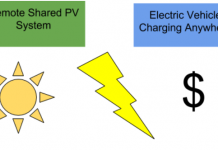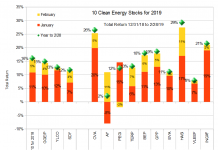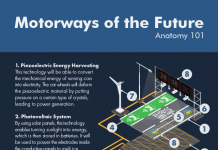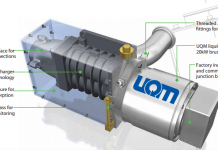Tom Konrad CFA
My Ten Electric Vehicle (EV) Stocks article drew considerable attention and comments, including suggestions for stocks that did not make the ten. Here are my takes on the EV stocks suggested by readers.
All of these companies do have something to do with electric vehicles (EVs) or hybrid electric vehicles (HEVs), but many were omitted from the original list because EV and HEV exposure was quite small as a fraction of total revenue. This matters because, even when a small segment of a company is growing rapidly, it can have very little effect on the company’s overall performance. For instance, if a company gets 5% of its revenues from its EV-related business, and the revenue from this segment doubles, that doubling will only produce a 5% rise in overall revenues. The company’s overall performance is likely to be dominated by other segments if its revenue and earnings are dominated by other segments.
Rogers Corp (ROG) – suggested by Andy Nagle.
Rogers provides products and materials to “a variety of markets, including portable communications, communications infrastructure, consumer electronics, mass transit, automotive, defense and alternative energy” according to the company. I believe that Andy recommended this one because they compete with CPS Technologies Corp. (CPSH.OB) (mentioned in Ten EV Stocks.) CPS Technologies also supplies advanced materials for mass transit, wind turbines, and electric and hybrid electric vehicles. Rogers Corp seems to be more (but not exclusively) focused on high performance foams, while CPS focuses on combinations of metals and ceramics. Roger’s segment breakdown was unhelpful in determining how much of the firm’s revenue comes from these alternative energy segments, but most of these seem to fall in their “Custom Electrical Components” segment, which was about 13% of revenues. If half of this revenue comes from alternative energy, that’s still too little to interest me in the company. Opinion: Not interesting from a peak oil investing perspective.
Capstone Turbine (CPST) – suggested by Robert B Ferguson
Capstone has a patented technology for micro turbines which allow for the relatively efficient combustion of gaseous and liquid fuels at a smaller scale than is possible with conventional turbines. In the past, I’ve highlighted Capstone as a potential beneficiary of a move to distributed combined heat and power or cogeneration applications. Over the last couple years, the company has also been pursuing opportunities as a generator for hybrid electric vehicles, with an emphasis on larger vehicles such as boats, buses, and trucks. With the exception of buses, Capstone’s HEV applications are still in the demonstration stage, but the many other applications for micro turbines in stationary distributed power should be interesting to investors looking for a broader exposure to alternative energy. Both DesignLine and EcoPower Technology have developed buses using Capstone’s 30 kW turbines. DesignLine has received an initial order of 90 HEV buses incorporating Capstone turbines from the New York MTA.
Unfortunately, Capstone is not profitable and has little prospect of reaching profitability with current cash on hand. Opinion: Avoid until financial position improves.
Advanced Battery Technologies (ABAT) – suggested by Deepfryer999
I left this Chinese Polymer Lithium-Ion battery company with an interest in electric bicycles and mopeds off my first list not because it does not deserve to be there, but because John Petersen, who also writes for AltEnergyStocks, covers battery companies (including ABAT) for us. John will probably forgive me for this brief foray into his territory, but check the comments, because he’ll also correct me if I get something wrong.
In my opinion, battery companies are among the better ways to play EVs and HEVs, because the market for such vehicles is still very young leading to a lot of uncertainty as to which EV manufacturers will succeed. In contrast, the market for batteries is established, with many existing profitable companies, and electrified vehicles represent a large new source of demand for the industry’s products. If EVs are a flop and that demand fails to materialize, battery companies will be hurt due to what will turn out to be overbuilding in anticipation of large demand for batteries and government incentives. On the other hand, a single EV requires so many batteries that if electric vehicles do become popular, the industry will have trouble keeping up with demand: even HEVs alone should be able to accommodate the increased battery manufacturing capacity.
Turning back to ABAT, the company is profitable and has a solid balance sheet. At the recent price of $3.54, it has a trailing P/E Ratio (9.1) and Price/Book Ratio (1.75) of a value stock. ABAT acquired Wuxi ZQ, a manufacturer of electric bikes and scooters in May 2009 for an approximate 4.5% ownership stake in ABAT. Wuxi ZQ is exporting thousands of two wheeled EVs (2WEV) to the US. According to the most recent quarterly statement, batteries for EVs account for 46% of ABAT’s battery sales. Although the company did not break out the value of 2WEV sales, we can assume that about half of the company’s revenues are attributable to EVs.
Opinion: A good prospect for further research.
Toyota (TM) and Nissan (NSANY.PK) – suggested by Big Bear Lake Hostel
In 2009, Toyota sold 195,545 hybrids and no EVs, out of total sales of 1,770,149 vehicles, or 11% of sales. The 2011 plug-in hybrid Prius will likely have limited runs as Toyota becomes comfortable with plug-in technology.
Nissan has only one hybrid model, the fun-to-drive Altima Hybrid (I speak from experience when I say it’s fun to drive: my wife has one.) With one model available in only 9 states, Nissan sold only 842 hybrids in 2009. I could not find annual sales numbers for 2009, but the company expects to sell 850,000 units in 2010, which means that 2009 hybrid sales would be only 0.1% of total 2010 sales. Nissan’s hybrids are not the reason people are excited about the company: the excitement surrounds the rapidly selling Nissan Leaf EV. Nissan now has 17,000 reservations for the Leaf, but only half of those are in the initial launch markets, and most of those are unlikely to be delivered in 2010. While Nissan claims that Leaf production capacity “will soon approach 500,000 units per year,” more likely sales numbers will be shaped by the number of reservations in target markets: perhaps 5,000 Leafs in 2011, or less than 1% of total auto sales.
If either of these car companies can be considered an EV or HEV company, it’s Toyota because of its success delivering hybrids, but with the recent quality problems of the Prius, I expect Prius sales to fall as a percentage of total Toyota vehicles sales in 2010. Opinion: Toyota and Nissan are best analyzed as conventional car companies, not EV or HEV companies.
 |
| Charge port for Nissan Leaf EV |
Enova Systems (ENA) – suggested by Investingfun
Enova makes drive systems for electric and hybrid electric buses, medium and heavy duty commercial vehicles, stationary power generation systems, train locomotives, transit buses, and industrial vehicles, as well as for light, medium, and heavy duty trucks. It also makes power management and power conversion components for stationary distributed power generation systems, so from the perspective of exposure to electric vehicles, Enova is extremely well placed. I especially like the exposure to heavy vehicles which I consider well-suited to electrification, and the exposure to alternative transportation in the form of trains and buses. They have an impressive line-up of deals, including with Smith Electric Vehicles, the development of an electric drive system with Remy, Inc., and a hybrid school bus order all announced in the last few months.
Unfortunately, Enova is still a long way from profitability and most likely will need to raise additional funds within a year. Unless the financial climate improves, such fund raising will be at the expense of diluting existing shareholders. Opinion: Avoid until financial situation improves.
Conclusion
The only company in this list I would consider buying is Advanced Battery Technologies, since all of the others are either unprofitable and in need of outside funding, or not firmly in the electric vehicle space. If you are looking for a Tesla (TSLA) at a better stock valuation, you would do well to research ABAT, as well as the three decent prospects I found among my previous list of ten EV and HEV stocks.
DISCLOSURE: No Positions.
DISCLAIMER: The information and trades provided here are for informational purposes only and are not a solicitation to buy or sell any of these securities. Investing involves substantial risk and you should evaluate your own risk levels before you make any investment. Past results are not an indication of future performance. Please take the time to read the full disclaimer here.









I think ABAT is an extraordinary company. I’ve always been impressed with management’s ability to maintain solid margins and minimize operating costs. The Wuxi Angel acquisition strikes me as a brilliant stroke because the electric two-wheeled (E2W) market is supposed to effectively triple from 24 million units in 2008 to about 80 million units by 2015. It’s easy to criticize electric cars where the vehicle weight is up to 10x the average passenger weight, but much harder where the ratio is closer to 1:1. It’s just a guess, but I think the E2W market will be much more important in the US and Europe than most analysts expect, particularly among the young.